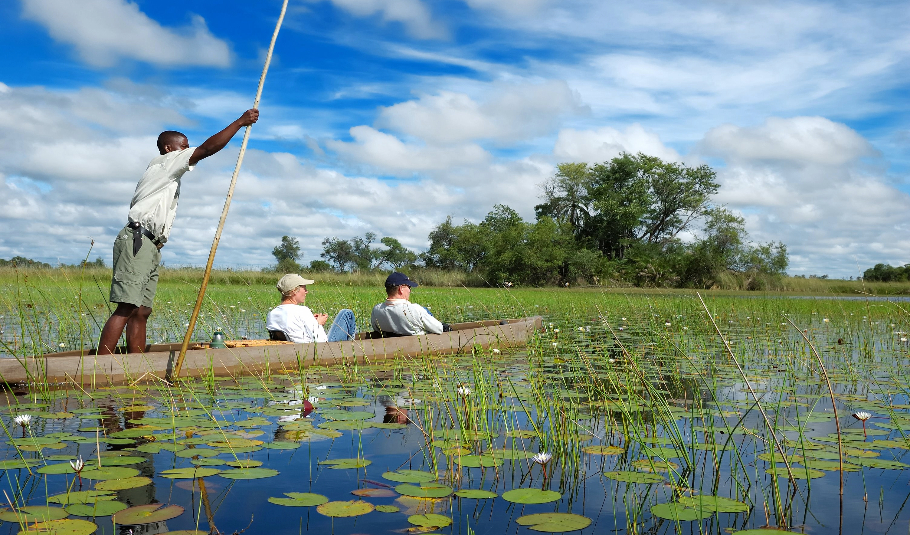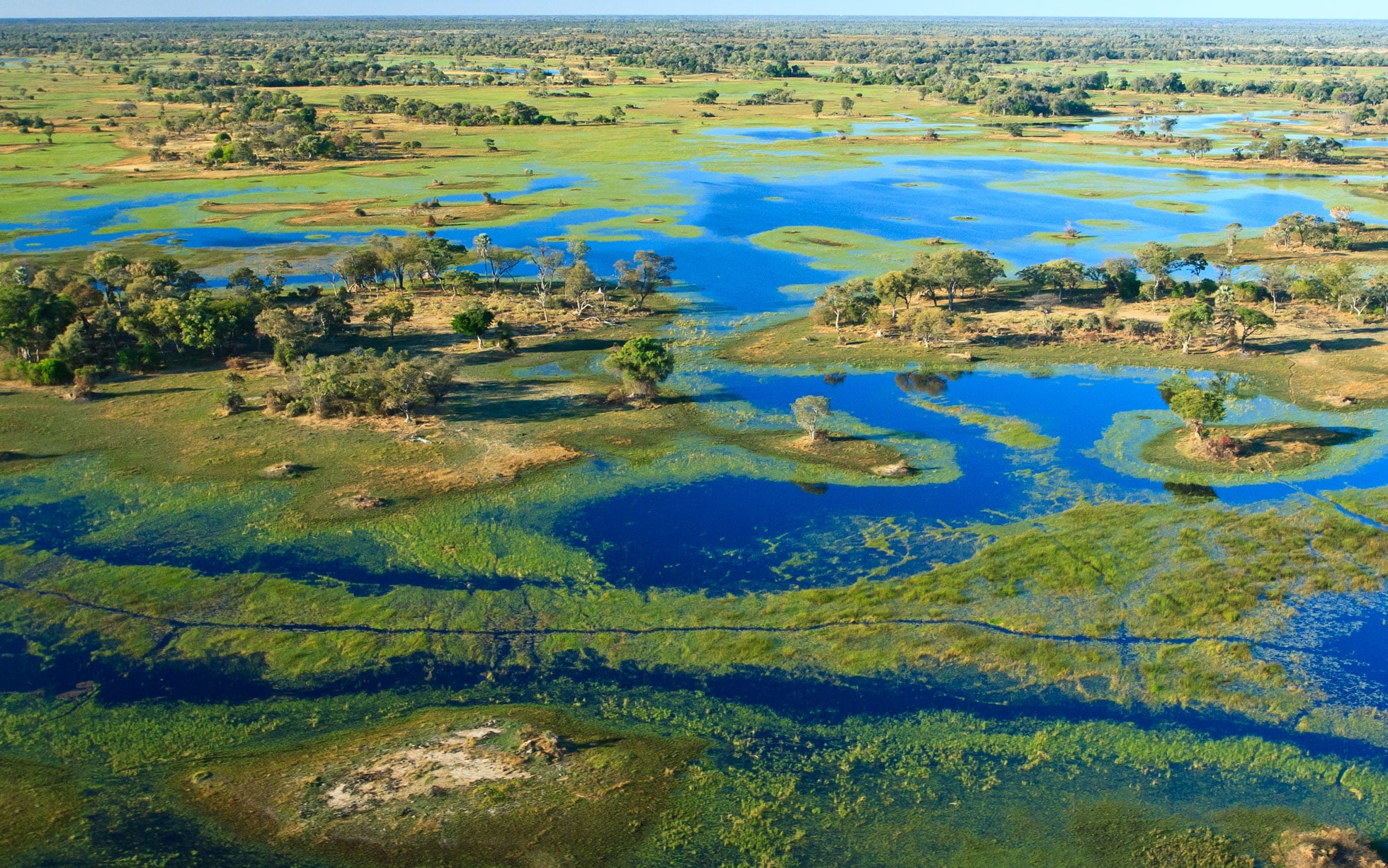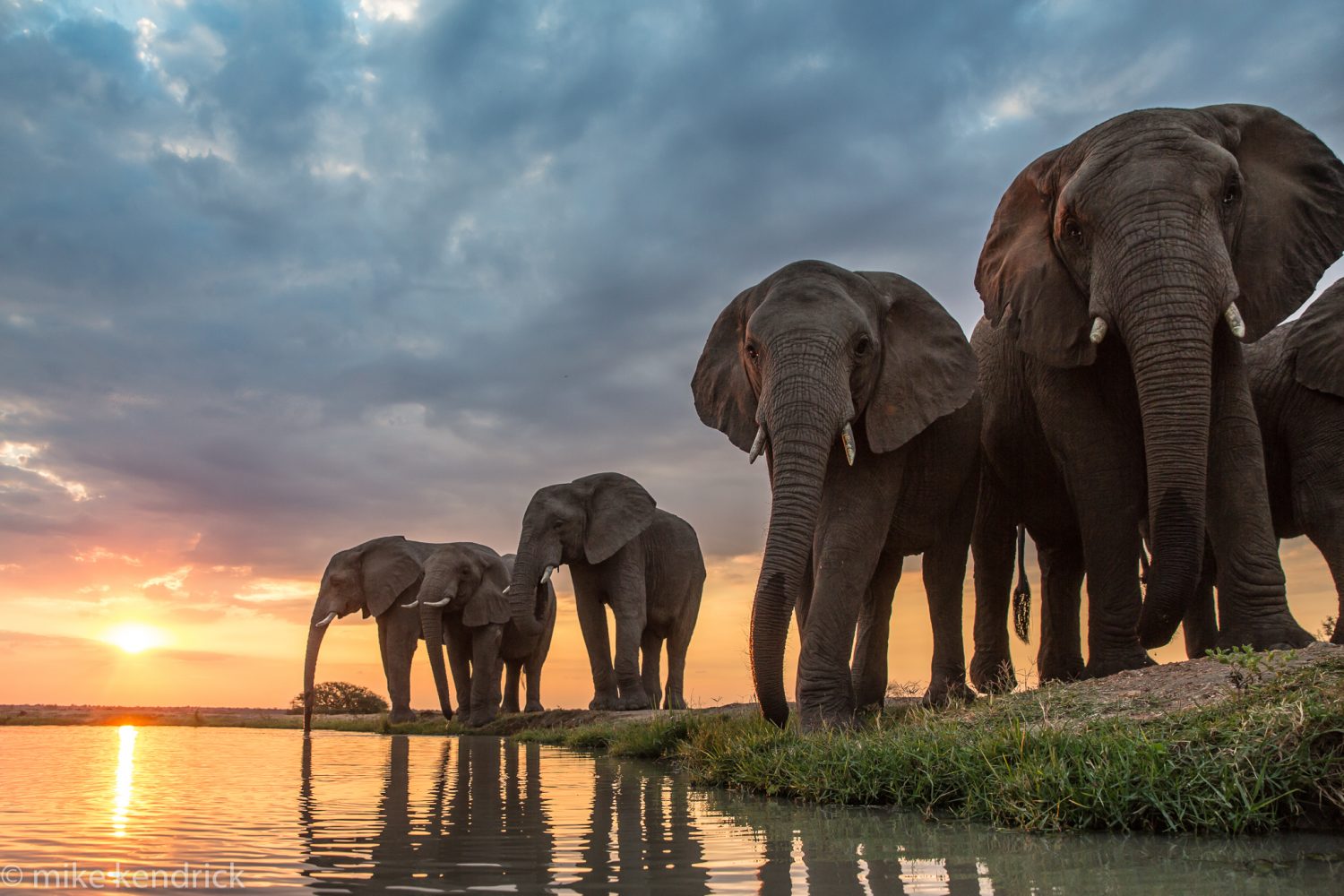Exploring the Okavango Delta: A Dream Tour for New Zealand Adventurers

Introduction
Overview of the Okavango Delta
The Okavango Delta, a UNESCO World Heritage Site located in Botswana, is one of the planet's most extraordinary inland deltas. This vast network of channels, lagoons, and islands spreads across approximately 15,000 square kilometres, feeding into the Kalahari Desert. The annual flood cycle transforms the landscape, creating a vibrant oasis teeming with life. An array of ecosystems thrives here, supported by the seasonal rise and fall of waters from the Okavango River.
Visitors are often captivated by its stunning natural beauty, where lush vegetation meets serene waterways, and the sounds of wildlife resonate through the air. The Delta offers a unique opportunity to explore both land and water habitats, making it a prime spot for adventurers and nature enthusiasts alike.
Why the Okavango Delta is a Dream Tour Destination
The Okavango Delta stands out as a dream destination for several compelling reasons:
- Biodiversity: It is home to an impressive variety of wildlife, including elephants, lions, leopards, and numerous bird species, making game viewing unparalleled.
- Unique Experiences: Visitors can partake in a range of activities, from traditional mokoro canoe trips to thrilling safari excursions, each presenting a different perspective of this remarkable environment.
- Cultural Richness: Engaging with the local communities, such as the San people, provides insight into ancient traditions and ways of life that have endured for centuries.
- Scenic Beauty: The scenic vistas, marked by papyrus reeds and water lilies, create innumerable photography opportunities, ensuring that memories will last a lifetime.
With its combination of stunning landscapes, rich wildlife, and cultural interactions, the Okavango Delta is rightfully regarded as one of the top travel destinations in Africa. From the moment one arrives, there is an undeniable sense of adventure waiting to unfold.

Planning Your Trip to the Okavango Delta
Best time to visit
Timing is key when planning a trip to the Okavango Delta, as the experience can greatly vary throughout the year. The ideal time to visit typically spans from June to October, coinciding with the dry season. During these months, wildlife congregates around water sources, making game viewing exceptionally rewarding.
- Peak Wildlife Viewing: This period also ushers in cooler temperatures and less humidity, providing comfortable conditions for exploration.
- Flood Season: The waters usually peak between May and July, transforming the Delta into a watery paradise, perfect for mokoro canoe trips.
Visiting during the wet season, from November to April, offers its own charms, such as lush greenery and migratory birds, but can bring rain and access issues to some regions.
How to get there
Reaching the Okavango Delta requires some planning, primarily due to its remote location. Most visitors fly into Maun, the nearest major town, which serves as the gateway to the Delta.
- Flights: Numerous airlines offer regular flights to Maun from Johannesburg and other major cities.
- Transfers: From Maun, guests can opt for charter flights or guided safaris that lead directly into the heart of the Delta.
For those who enjoy the journey, self-driving is possible but requires an adventurous spirit and a well-equipped 4x4 vehicle!
Accommodation options
Accommodation in the Okavango Delta caters to a variety of budgets and preferences.
- Luxury Lodges: For those seeking an upscale experience, several luxury lodges and tented camps provide exquisite amenities and personalised services.
- Mid-range Options: There are also comfortable safari lodges that offer excellent service without breaking the bank.
- Campsites: For a more rustic experience, camping options allow visitors to immerse themselves in nature. Most campsites are well-equipped with the necessary facilities.
Selecting the right accommodation can significantly enrich the overall experience in this majestic wilderness.

Activities to Experience in the Okavango Delta
Safari tours
One of the highlights of any visit to the Okavango Delta is the plethora of safari tours available to explore its rich wildlife. These tours are designed to provide an immersive experience in the wild, allowing guests to get up close and personal with a variety of species in their natural habitat.
- Game Drives: Guided game drives in open 4x4 vehicles give a unique vantage point to spot elephants, lions, giraffes, and more. Early morning or late afternoon drives are particularly rewarding, as animals are more active during these cooler parts of the day.
- Walking Safaris: For those looking for a more intimate connection with nature, walking safaris offer a thrilling opportunity to explore on foot. Accompanied by experienced guides, guests can learn about the different flora and fauna while tracking wildlife trails.
Mokoro excursions
For a truly unique adventure, mokoro excursions are a must. These traditional dugout canoes, paddled by local guides, provide a serene way to navigate the Delta's labyrinth of waterways.
- Close Encounters with Nature: Gliding silently along the channels allows for unmatched opportunities to see crocodiles sunning themselves and hippos surfacing for air. The experience is peaceful and offers an extraordinary perspective of the landscape.
- Cultural Insight: Your guide will often share insights about the ecology and cultural significance of the Delta, deepening the connection to this enchanting environment.
Bird watching
The Okavango Delta is a paradise for bird watchers, boasting over 400 species. The diverse range of habitats makes it an excellent spot for both novice and experienced birders.
- Diverse Species: Look out for vibrant birdlife, including the Lilac-breasted Roller, African Fish Eagle, and the elusive Pel's Fishing Owl.
- Best Viewing Seasons: The best time for bird watching is during the wet season, when migratory birds add to the local population.
Whether on a safari, in a mokoro, or simply observing the flurry of feathers around, the activities in the Okavango Delta offer an unforgettable experience for nature lovers and adventure seekers alike.

Wildlife and Nature Conservation in the Okavango Delta
Biodiversity
The Okavango Delta is a testament to nature’s incredible diversity. This ecological gem supports a rich tapestry of life, with various ecosystems coexisting and thriving. The Delta is home to more than:
- 550 Species of Birds: From the stunning vibrancy of the African Jacana to the majestic Fish Eagles, birdwatchers will have a field day navigating the skies.
- 80 Species of Mammals: Iconic wildlife such as elephants, buffalo, and antelope roam freely across the expansive floodplains. The Delta also supports critical populations of more elusive species like leopards and wild dogs.
- Over 1,300 Plant Species: The waterways and wetlands are adorned with diverse plant life, creating vital habitats for numerous animal species while also playing a crucial role in the local ecosystem.
This rich biodiversity not only contributes to the ecological balance of the region but also offers significant opportunities for research and education, fostering a greater understanding of complex environmental interdependence.
Conservation efforts
Preserving the Okavango Delta's unique habitats and wildlife is paramount, and various conservation efforts are underway to ensure its protection.
- Community Involvement: Local communities are increasingly engaged in conservation initiatives, creating a sense of ownership and responsibility towards their environment. This involvement is essential for sustainable tourism, ensuring that communities benefit economically while prioritising ecological preservation.
- Wildlife Protection: Anti-poaching patrols and wildlife monitoring programs have been implemented to protect endangered species from illegal hunting, thereby helping to maintain biodiversity.
- Environmental Education: Numerous organisations focus on educating both locals and tourists about conservation efforts. By raising awareness and fostering responsible tourism practices, the hope is to safeguard this natural wonder for future generations.
Together, these efforts are crucial in maintaining the delicate balance of the Okavango Delta, a region that is not only vital for its wildlife but also a treasure for countless visitors seeking to experience its wonders.
Cultural Experiences in the Okavango Delta
Interactions with local communities
A visit to the Okavango Delta offers a unique chance to engage with the local communities that have harmoniously coexisted with this extraordinary landscape for generations. Engaging with these communities enhances one’s understanding of the Delta’s cultural richness and traditions.
- Cultural Tours: Many lodges and tour operators arrange cultural tours that include visits to nearby villages. Visitors can experience the daily lives of the people, participate in traditional activities, and learn about their connection to the land.
- Local Handicrafts: Purchasing local crafts, such as beadwork, woven baskets, and wooden carvings, not only supports the local economy but also allows travellers to take home a piece of the Delta’s rich culture.
- Storytelling and Music: Many community visits include storytelling sessions, where local elders share ancient tales that pass down knowledge and morals through generations. Traditional songs and dances further enrich the experience, allowing visitors to immerse themselves in the cultural heritage.
Traditional practices and customs
The people of the Okavango Delta follow customs that are deeply influenced by their relationship with nature. Understanding these practices adds a layer of appreciation for the region’s cultural landscape.
- Fishing and Hunting: Traditional methods of fishing and hunting are still practised, reflecting sustainable practices that have been utilised for centuries. Engaging in these activities under the guidance of local experts offers a hands-on understanding of their cultural significance.
- Medicinal Knowledge: The community’s traditional healers often have profound knowledge of the local flora and fauna, using indigenous plants for medicinal purposes. Visitors can learn about the process and significance of these practices during guided walks.
- Festivals and Celebrations: Participating in local festivals, such as harvest celebrations, allows visitors to witness the vibrant cultural expressions through dance, food, and art.
These cultural experiences shape an understanding of the community's way of life and create lasting memories, making a trip to the Okavango Delta not just about nature but also about the rich tapestry of human culture intertwined with the wilderness.
Safety Tips and Precautions for Exploring the Okavango Delta
Health considerations
Exploring the Okavango Delta offers a plethora of breathtaking experiences, but it is vital to address health considerations to ensure a safe journey. Here are some key health-related tips to keep in mind:
- Vaccinations: Prior to travelling, consult your healthcare provider for recommended vaccinations. Common suggestions may include Hepatitis A and B, Typhoid, and Tetanus. Additionally, a vaccination against Yellow Fever is often required if you are coming from an endemic zone.
- Malaria Prevention: The Delta is a malaria-risk area, particularly during the rainy season (November to April). Consider taking anti-malarial medication and ensure you pack insect repellent with a high DEET concentration. Wearing long sleeves and trousers during dusk and dawn can also be beneficial.
- Stay Hydrated: The warm climate can lead to dehydration, so it’s essential to drink plenty of water while exploring. Always choose bottled water if unsure about the quality of local supplies.
Wildlife encounters
When venturing into wildlife-rich areas like the Okavango Delta, it’s crucial to approach wildlife encounters with caution and respect.
- Follow Guidelines: Always adhere to the guidelines set by your guides. They are trained to manage encounters, whether on foot or in a vehicle, ensuring your safety while maximising wildlife viewing opportunities.
- Maintain Distance: Whether observing elephants, lions, or hippos, keeping a safe distance is paramount. Approaching too closely can provoke unwanted behaviour, putting both visitors and animals at risk.
- Stay Calm: If an animal approaches or shows signs of agitation, it’s important to remain calm and listen to your guide. They will know the best course of action to keep everyone safe.
Being informed and prepared can significantly enhance both safety and enjoyment during your explorations. By taking health precautions and respecting wildlife, visitors can create lasting memories in the enchanting landscape of the Okavango Delta while ensuring a safe and fruitful adventure.

Conclusion
Recap of the Okavango Delta experience
The Okavango Delta is a mesmerising wonder, famously characterised by its intertwined waterways and breathtaking wildlife diversity. Throughout the journey, visitors can immerse themselves in a variety of experiences, from thrilling safari tours to serene mokoro excursions and vibrant cultural interactions with local communities. The Delta offers a unique blend of adventure and tranquillity, creating memories that linger long after the journey concludes.
Highlights of the Okavango Delta experience include:
- Stunning Biodiversity: An opportunity to witness a diverse range of wildlife, including elephants, lions, and over 400 bird species, in their natural habitat.
- Cultural Depth: Engaging with local communities fosters a deeper connection to the rich traditions and lifestyles that have been preserved through generations.
- Conservation Awareness: Understanding the ongoing conservation efforts enhances appreciation for this ecological treasure and the importance of preserving it.
Final thoughts and recommendations
For anyone contemplating a visit, the Okavango Delta promises not just a trip, but a profound journey into nature and culture. Here are some final thoughts and recommendations to ensure a rewarding experience:
- Plan Ahead: Proper planning is essential, from selecting accommodation to scheduling activities. Consider your interests, whether they lie in wildlife, culture, or adventure.
- Stay Open-Minded: Each experience in the Delta can differ, with the ebb and flow of nature. Being adaptable can lead to unexpected adventures and a deeper appreciation.
- Embrace the Local Culture: Engaging with the local communities offers insights that can significantly enrich your visit. Be respectful, learn, and appreciate the customs and practices.
In essence, a trip to the Okavango Delta not only creates lasting memories anchored in nature but also fosters a greater connection to the world’s wonders and the communities that cherish them. Whether seeking adventure, relaxation, or cultural immersion, this Botswana gem is sure to leave a lasting impact.
